Global Market Comments
March 8, 2023
Fiat Lux
Featured Trade:
(INVESTING IN A STATE SPONSOR OF TERRORISM),
(AFK), (GAF), (EZA)
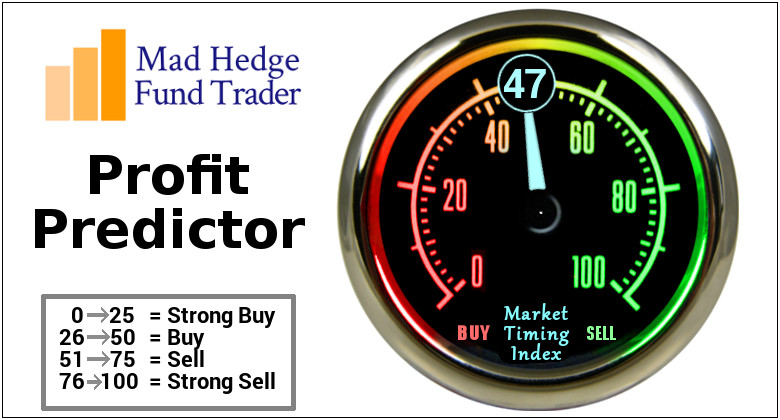
CLICK HERE to download today's position sheet.
Global Market Comments
March 8, 2023
Fiat Lux
Featured Trade:
(INVESTING IN A STATE SPONSOR OF TERRORISM),
(AFK), (GAF), (EZA)

CLICK HERE to download today's position sheet.
With the US dollar about to peak out and resume a decade-long plunge, it’s time to think outside the box.
How about a country whose leaders have stolen $400 billion in the last decade and have seen 300 foreign workers kidnapped?
Another country lost four wars in the last 40 years.
Still interested?
How about a country that suffers one of the world’s highest AIDs rates, endures regular insurrections where all of the Westerners get massacred and racked up 5 million dead in a continuous civil war?
Then, Africa is the place for you, the world’s largest source of gold, diamonds, chocolate, and cobalt! The countries above are Libya, Nigeria, Egypt, and the Congo.
Below the radar of the investment community since the colonial days, the Dark Continent has recently been attracting the attention of large hedge funds and private equity firms.
Goldman Sachs has set up Emerging Capital Partners, which has already invested billions there. China sees the writing on the wall and has launched a latter-day colonization effort, taking a 20% equity stake in South Africa’s Standard Bank, the largest on the continent. There are now thought to be over one million Chinese agricultural workers in Africa.
The angle here is that all of the terrible headlines above are in the price, that prices are very low, and the perceived risk is much greater than actual risk.
Price earnings multiples are low single digits, cash flows are huge, and returns of capital within two years are not unheard of. These numbers remind me of those found in Japan during the fifties, right after it lost WWII.
The reality is that Africa’s 900 million have unlimited demand for almost everything, and there is scant supply, with many firms enjoying local monopolies. The big plays are your classic early emerging market targets, like banking, telecommunications, electric power, and other infrastructure.
For example, in the last decade, the number of telephones has soared from 350,000 to 10 million. It’s like the early days of investing in China in the seventies when the adventurous only played when they could double their money in two years because the risks were so high.
This is definitely not for day traders. If you are willing to give up a lot of short term liquidity for a high long term return, then look at the Market Vectors Africa Index ETF (AFK), which has 29% of its holdings in South Africa and 20% in Nigeria. There is also the SPDR S&P Emerging Middle East & Africa ETF (GAF). For more of a rifle shot, entertain the iShares MSCI South Africa Index Fund (EZA). Don’t rush out and buy these today. Instead, wait for emerging markets to come back in vogue. I will send you a trade alert when this is going to happen.
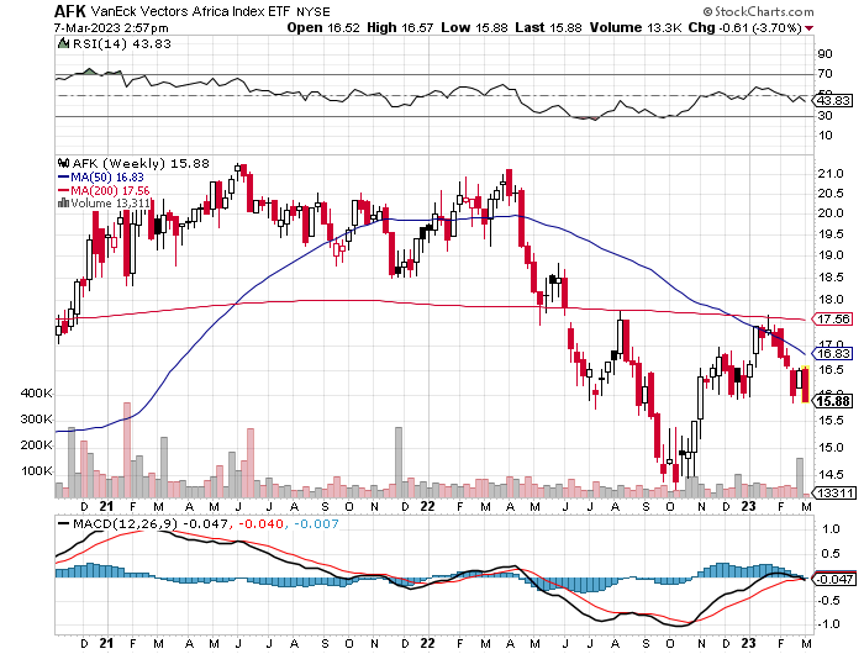
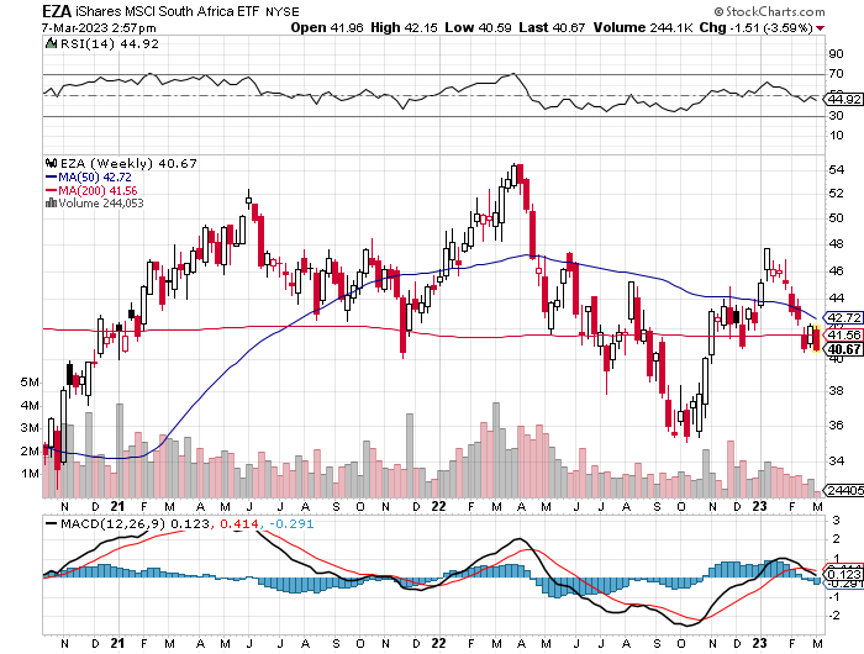
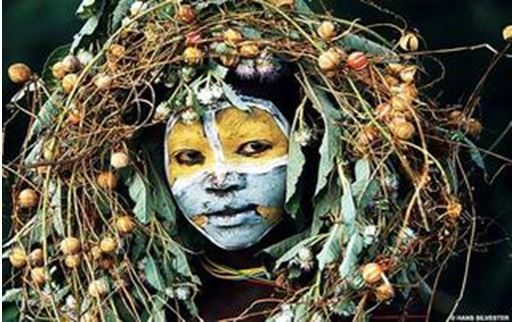
Feel like investing in a state sponsor of terrorism? How about a country whose leaders have stolen $400 billion in the last decade and has seen 300 foreign workers kidnapped? Another country lost four wars in the last 40 years.
Still interested? How about a country that suffers the world?s highest AIDS rate, regularly endures insurrections where all of the Westerners are rounded up and massacred, and racked up 5 million dead in a continuous civil war?
Then, Africa is the place for you, the world?s largest source of gold, diamonds, chocolate, and cobalt!
The countries above are Libya, Nigeria, Egypt, and the Congo. Below the radar of the investment community since the colonial days, the Dark Continent has recently been attracting the attention of large hedge funds and private equity firms.
Goldman Sachs has set up Emerging Capital Partners, which has already invested $2 billion there. China sees the writing on the wall, and has launched a latter day colonization effort, taking a 20% equity stake in South Africa?s Standard Bank, the largest on the continent.
In fact, foreign direct investment last year jumped from $53 billion to $61 billion, while cross border M & A leapt from $10.2 billion to $26.3 billion.
The angle here is that all of the headlines above are in the price, that price is very low, and the perceived risk is much greater than actual risk. Price earnings multiples are low single digits, cash flows are huge, and returns of capital within two years are not unheard of.
The reality is that Africa?s 900 million have unlimited demand for almost everything, and there is scant supply, with many firms enjoying local monopolies.
African GDP growth took off like a rocket in 2003, nearly tripling, thanks to the global commodity and precious metals boom and the taming of AIDS with free generic antiretroviral drugs. Equity markets don?t reflect this yet.
The big plays are your classic early emerging market targets, like a rising middle class, banking, telecommunications, electric power, and other infrastructure.
For example, in the last decade, the number of telephones has soared from 350,000 to 10 million. It reminds me of the early days of investing in China in the seventies, when the adventurous only played when they could double their money in two years, because the risks were so high.
This is long term back book stuff and is definitely not for day traders. If you are willing to give up a lot of short-term liquidity for a high return, then look at the Market Vectors Africa Index ETF (AFK), and the SPDR S&P Emerging Middle East & Africa ETF (GAF).
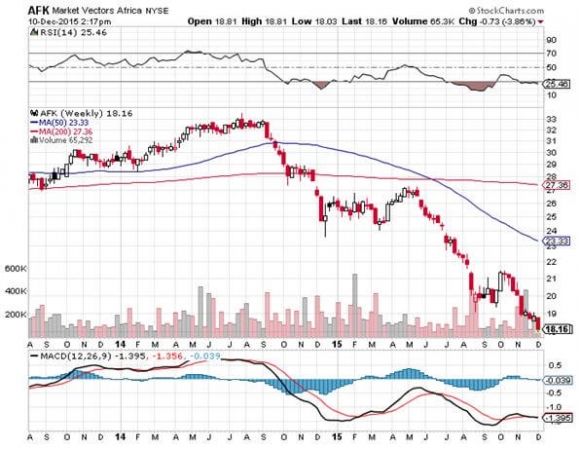
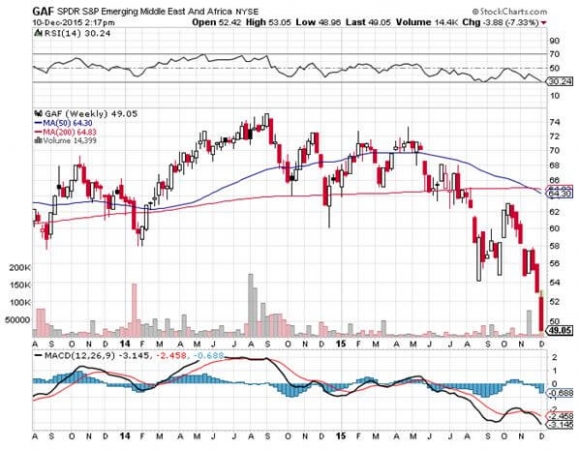
How about buying shares in a country whose leaders have stolen $400 billion in the last decade and have seen 300 foreign workers kidnapped?
Another country lost four wars in the last 40 years. Still interested? How about a country that suffers one of the world's highest AIDs rates, endures regular insurrections where all of the Westerners get massacred, and racked up 5 million dead in a continuous civil war?
Then, Africa is the place for you! Today, it is the world's largest source of gold, diamonds, iridium, chocolate, and cobalt. The countries above are Libya, Nigeria, Egypt, and the Congo. Below the radar of the investment community since the colonial days, the Dark Continent has recently been attracting the attention of large hedge funds and private equity firms.
Goldman Sachs has set up Emerging Capital Partners, which has already invested $2 billion there. China sees the writing on the wall, and has launched a latter day colonization effort, taking a 20% equity stake in South Africa's Standard Bank, the largest on the continent. There are now thought to be over one million Chinese agricultural workers in Africa.
In fact, foreign direct investment in 2010 jumped from $53 billion to $61 billion, while cross border M & A leapt from $10.2 billion to $26.3 billion. The angle here is that all of the terrible headlines above are in the price, that prices are very low, and the perceived risk is much greater than actual risk.
Price earnings multiples are low single digits, cash flows are huge, and returns of capital within two years are not unheard of. These numbers remind me of those found in Japan during the fifties, right after it lost WWII.
The reality is that Africa's 900 million have unlimited demand for almost everything, and there is scant supply, with many firms enjoying local monopolies. The big plays are your classic early emerging market targets, like banking, telecommunications, electric power, and other infrastructure.
For example, in the last decade, the number of telephones has soared from 350,000 to 10 million. It's similar to the early days of investing in China in the seventies, when the adventurous only played when they could double their money in two years, because the risks were so high.
This is definitely not for day traders. If you are willing to give up a lot of short term liquidity for a high long term return, then look at the Market Vectors Africa Index ETF (AFK), which has 29% of its holdings in South Africa and 20% in Nigeria. There is also the SPDR S&P Emerging Middle East & Africa ETF (GAF). For more of a rifle shot, entertain the iShares MSCI South Africa Index Fund (EZA). Don't rush out and buy these today. Instead, wait for emerging markets to come back in vogue, I'll send you a trade alert when this is going to happen.
 Meet Your New Partner
Meet Your New PartnerFeel like investing in a state sponsor of terrorism? How about a country whose leaders have stolen $400 billion in the last decade and has seen 300 foreign workers kidnapped? Another country lost four wars in the last 40 years. Still interested? How about a country that suffers the world?s highest AIDS rate, regularly endures insurrections where all of the Westerners are massacred, and racked up 5 million dead in a continuous civil war?
Then, Africa is the place for you, the world?s largest source of gold, diamonds, chocolate, and cobalt! The countries above are Libya, Nigeria, Egypt, and the Congo. Below the radar of the investment community since the colonial days, the Dark Continent has recently been attracting the attention of large hedge funds and private equity firms.
Goldman Sachs has set up Emerging Capital Partners, which has already invested $2 billion there. China sees the writing on the wall, and has launched a latter day colonization effort, taking a 20% equity stake in South Africa?s Standard Bank, the largest on the continent. In fact, foreign direct investment last year jumped from $53 billion to $61 billion, while cross border M & A leapt from $10.2 billion to $26.3 billion.
The angle here is that all of the headlines above are in the price, that price is very low, and the perceived risk is much greater than actual risk. Price earnings multiples are low single digits, cash flows are huge, and returns of capital within two years are not unheard of. The reality is that Africa?s 900 million have unlimited demand for almost everything, and there is scant supply, with many firms enjoying local monopolies.
African GDP growth took off like a rocket in 2003, nearly tripling, thanks to the global commodity and precious metals boom and the taming of AIDS with free generic antiretroviral drugs. Equity markets don?t reflect this yet. The big plays are your classic early emerging market targets, like a rising middle class, banking, telecommunications, electric power, and other infrastructure.
For example, in the last decade, the number of telephones has soared from 350,000 to 10 million. It reminds me of the early days of investing in China in the seventies, when the adventurous only played when they could double their money in two years, because the risks were so high. This is long term back book stuff, and is definitely not for day traders. If you are willing to give up a lot of short-term liquidity for a high long term return, then look at the Market Vectors Africa Index ETF (AFK), and the SPDR S&P Emerging Middle East & Africa ETF (GAF).
How about a country whose leaders have stolen $400 billion in the last decade and have seen 300 foreign workers kidnapped? Another country lost four wars in the last 40 years. Still interested? How about a country that suffers one of the world?s highest AIDs rates, endures regular insurrections where all of the Westerners get massacred, and racked up 5 million dead in a continuous civil war?
Then, Africa is the place for you, the world?s largest source of gold, diamonds, chocolate, and cobalt! The countries above are Libya, Nigeria, Egypt, and the Congo. Below the radar of the investment community since the colonial days, the Dark Continent has recently been attracting the attention of large hedge funds and private equity firms.
Goldman Sachs has set up Emerging Capital Partners, which has already invested $2 billion there. China sees the writing on the wall, and has launched a latter day colonization effort, taking a 20% equity stake in South Africa?s Standard Bank, the largest on the continent. There are now thought to be over one million Chinese agricultural workers in Africa.
The angle here is that all of the terrible headlines above are in the price, that prices are very low, and the perceived risk is much greater than actual risk.
Price earnings multiples are low single digits, cash flows are huge, and returns of capital within two years are not unheard of. These numbers remind me of those found in Japan during the fifties, right after it lost WWII.
The reality is that Africa?s 900 million have unlimited demand for almost everything, and there is scant supply, with many firms enjoying local monopolies. The big plays are your classic early emerging market targets, like banking, telecommunications, electric power, and other infrastructure.
For example, in the last decade, the number of telephones has soared from 350,000 to 10 million. It?s like the early days of investing in China in the seventies, when the adventurous only played when they could double their money in two years, because the risks were so high.
This is definitely not for day traders. If you are willing to give up a lot of short term liquidity for a high long term return, then look at the Market Vectors Africa Index ETF (AFK), which has 29% of its holdings in South Africa and 20% in Nigeria. There is also the SPDR S&P Emerging Middle East & Africa ETF (GAF). For more of a rifle shot, entertain the iShares MSCI South Africa Index Fund (EZA). Don?t rush out and buy these today. Instead, wait for emerging markets to come back in vogue. I will send you a trade alert when this is going to happen.
Meet Your New Business Partner
Legal Disclaimer
There is a very high degree of risk involved in trading. Past results are not indicative of future returns. MadHedgeFundTrader.com and all individuals affiliated with this site assume no responsibilities for your trading and investment results. The indicators, strategies, columns, articles and all other features are for educational purposes only and should not be construed as investment advice. Information for futures trading observations are obtained from sources believed to be reliable, but we do not warrant its completeness or accuracy, or warrant any results from the use of the information. Your use of the trading observations is entirely at your own risk and it is your sole responsibility to evaluate the accuracy, completeness and usefulness of the information. You must assess the risk of any trade with your broker and make your own independent decisions regarding any securities mentioned herein. Affiliates of MadHedgeFundTrader.com may have a position or effect transactions in the securities described herein (or options thereon) and/or otherwise employ trading strategies that may be consistent or inconsistent with the provided strategies.
This site uses cookies. By continuing to browse the site, you are agreeing to our use of cookies.
OKLearn moreWe may request cookies to be set on your device. We use cookies to let us know when you visit our websites, how you interact with us, to enrich your user experience, and to customize your relationship with our website.
Click on the different category headings to find out more. You can also change some of your preferences. Note that blocking some types of cookies may impact your experience on our websites and the services we are able to offer.
These cookies are strictly necessary to provide you with services available through our website and to use some of its features.
Because these cookies are strictly necessary to deliver the website, refuseing them will have impact how our site functions. You always can block or delete cookies by changing your browser settings and force blocking all cookies on this website. But this will always prompt you to accept/refuse cookies when revisiting our site.
We fully respect if you want to refuse cookies but to avoid asking you again and again kindly allow us to store a cookie for that. You are free to opt out any time or opt in for other cookies to get a better experience. If you refuse cookies we will remove all set cookies in our domain.
We provide you with a list of stored cookies on your computer in our domain so you can check what we stored. Due to security reasons we are not able to show or modify cookies from other domains. You can check these in your browser security settings.
These cookies collect information that is used either in aggregate form to help us understand how our website is being used or how effective our marketing campaigns are, or to help us customize our website and application for you in order to enhance your experience.
If you do not want that we track your visist to our site you can disable tracking in your browser here:
We also use different external services like Google Webfonts, Google Maps, and external Video providers. Since these providers may collect personal data like your IP address we allow you to block them here. Please be aware that this might heavily reduce the functionality and appearance of our site. Changes will take effect once you reload the page.
Google Webfont Settings:
Google Map Settings:
Vimeo and Youtube video embeds:
